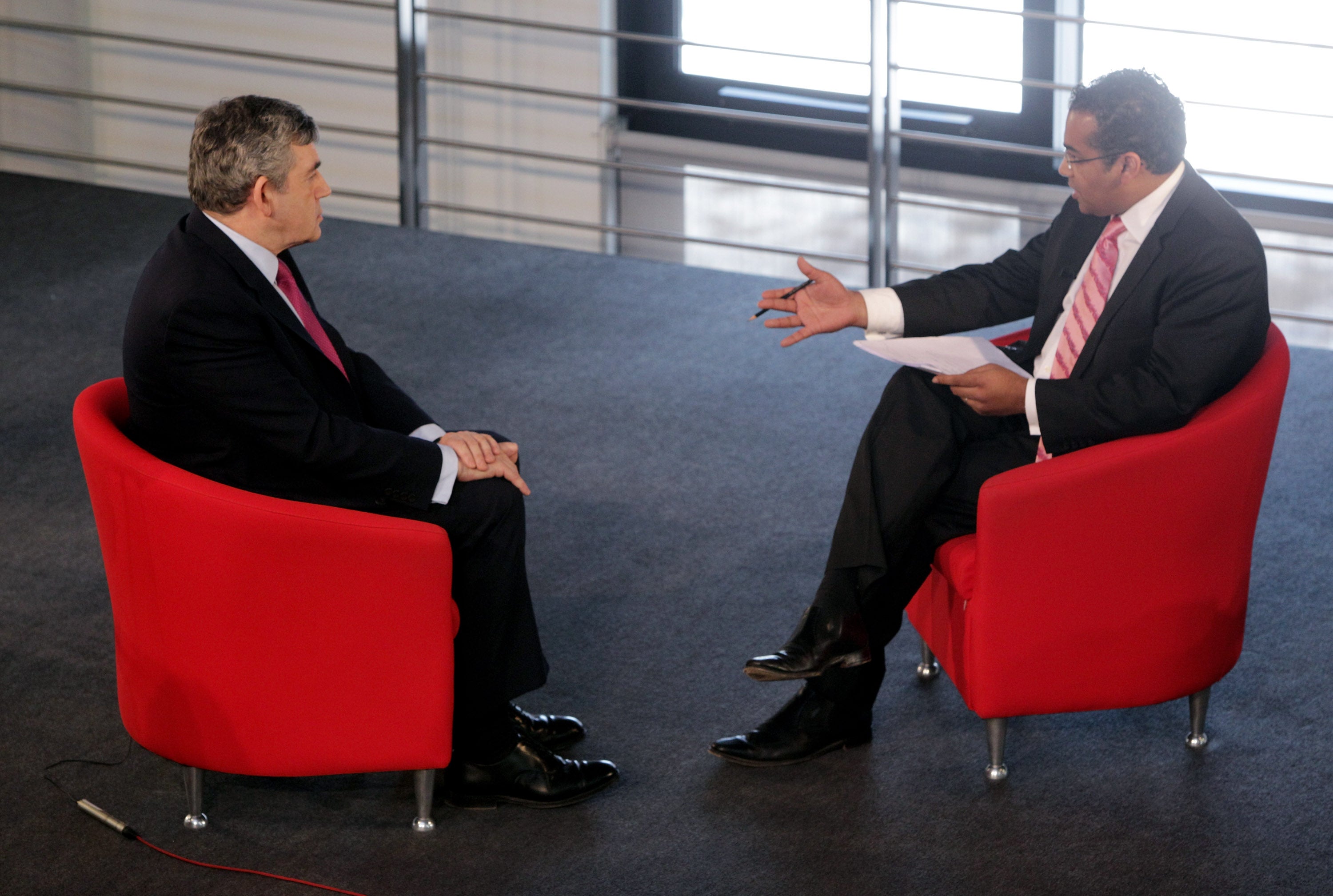Krishnan Guru-Murthy on Strictly, meeting Jimmy Savile and GB News: ‘I’ve never been interested in bust-ups with interviewees’
The presenter tells Fiona Sturges how he had to drop his armour and be vulnerable to compete for the glitterball trophy, why he thinks it’s a ‘terrible shame’ what is happening to the BBC’s ‘Newsnight’, and his ‘ghastly’ encounter with Jimmy Savile on his very first day working in TV


As a teenager, the Channel 4 News presenter Krishnan Guru-Murthy was all set on a career as a doctor. His father, whose name is also Krishnan, worked for the NHS as a consultant radiologist – now aged 90, he is still doing the same job – and it was assumed his son would follow suit. Krishnan Jr duly won a place at Oxford at 18 to study medicine. But then, in his gap year, he got a temporary gig presenting the BBC discussion series, Open to Question, in which famous figures were quizzed by an audience of teenagers. His very first guest? Jimmy Savile.
“Oh, he was awful,” Guru-Murthy recalls. “That much was apparent when I met him in make-up and he was dismissive and not interested in engaging with me. Then when the programme started, he reacted badly to it. He thought he was coming on to have a load of kids tell him how wonderful he was and [when they didn’t], you could see the shock on his face.” During the show, which is available online, Savile was challenged on his misogyny and called “a bit of an egotist”. When one young woman asked what, as a practising Catholic, he would do if one of his girlfriends became pregnant, he replied: “Well, I’d say ‘Who was it?’ as I boarded the train for Hong Kong.”
“I mean, he was talking to teenagers, so it was all just ghastly,” reflects Guru-Murthy. Nonetheless, the presenter called Oxford to say he wanted to switch to a politics degree so he could pursue a career in broadcasting. What made him change his mind? “It was just so gripping,” he explains. “That same day, we recorded a show with John Prescott, who was then trying to become deputy leader of the Labour Party. So one guy was at the centre of the news and the other guy was a massive figure in popular culture. I thought, ‘This is absolutely brilliant. I want to do this for the rest of my life.’”
Guru-Murthy, 53, is talking from his study at home in Kew in London on a rare morning off. Asked how it feels to be an interviewer being interviewed, he says he has only recently learned to relax and enjoy the process. “I decided with Strictly to put into action what I’ve always advised people when they ask how to do interviews, which is to just answer the question and tell the truth.”
Ah, yes, Strictly. When we speak, it is a fortnight since his elimination from the BBC dance competition; he has since confirmed he will be taking part in the Strictly Come Dancing tour, which kicks off in mid-January. Guru-Murthy, who was the seventh celebrity to be eliminated, remains shocked at having lasted so long. The series’ producers had been trying to get him on for years, but he always turned them down on the basis that he was too busy and “because I thought it would be ridiculous. I mean, how would I look?” But this year his two children had just finished their GCSEs and A-Ievels respectively, and were doing their own thing over the summer. “And I was already on a journey trying to get healthy and fit as I was sick of being middle-aged and decrepit and on my way to an early grave.” Along with Crohn’s disease, Guru-Murthy has a genetic heart condition called hypertrophic cardiomyopathy, which prompted him to seek assurances from his doctor that he was okay to compete and wouldn’t drop dead live on TV.
Beginning his Strictly training, Guru-Murthy quickly realised that “in order to do it, you’ve got to commit to it 100 per cent. That means anywhere between six and 10 hours of hard work every day, pushing yourself to the limit. To do that you have to be very open. I had to basically take off the armour that I’d built up over 30 years of doing the news and make myself vulnerable.” He was astonished to find his overwhelming emotion on the show wasn’t embarrassment but joy. “You experience happiness in this simple way that is very childlike. It reconnects you with these emotions that you have buried or pushed away. Professionally, my MO is to suppress how I feel about things and to not have emotional reactions to the stories I’m covering, so the experience was profound.”
This year marks 25 years on Channel 4 for Guru-Murthy, and 35 in broadcasting. He attributes his drive to his father who grew up in Burma (now Myanmar). His family had moved there from India to work on the railways. After Japan invaded Burma in 1941, their house was destroyed and the family was displaced, prompting them to journey back to India mostly on foot with barely any food. Krishnan Sr came with his wife to Britain in the Sixties and bought a house in a middle-class village just outside Burnley, in Lancashire. “So my dad was the one who made good from very difficult circumstances. The idea of getting a good job and becoming a professional, that’s where that came from because if you don’t you might find yourself on the streets.”

After graduating from university, Guru-Murthy got a job presenting the BBC children’s current affairs show Newsround where he covered everything from the war in the former Yugoslavia and an earthquake in India to a new boyband called Take That. Three years later he took a pay cut to work as an assistant producer on Newsnight. He was 24 at the time and keen to move into broadcasting’s big league. Back then, he notes, Newsnight was “the pinnacle of television journalism. It was about duffing up cabinet ministers and going around the world doing great stories.” We are talking the day after the BBC has announced cuts to the Newsnight budget and a focus away from original reporting in favour of studio interviews and debates. “I think it’s a terrible shame,” he says. “People say ‘Well, the audience has dwindled and TV audiences generally have gone down,’ and that’s all true. But that doesn’t mean you give up. Taking money away from it and taking away its staff and its reporters leaves it, well, I’m not sure what it is now. It’s called Newsnight but is it still Newsnight? I don’t know.”
If Guru-Murthy feels gloomy about the fate of Newsnight, it’s perhaps because it feels personal. He is comparatively blasé about the rise of wilfully partisan channels such as GB News and TalkTV, which he points out that few watch and which have little to do with news journalism. “I think the issue with all of those channels is how power treats them. It’s that if those in power decide ‘I would rather appear on a channel that is on my side than a channel that is trying to hold me to account’, that is a real threat. At the moment it’s the Conservatives, but it could easily happen with Labour as well.”
Contemplating his own role as a broadcaster, Guru-Murthy says his job is “to tell people stuff they don’t know, to hold powerful people to account, whether they’re politicians or businesspeople, and to tell the stories of people around the world”. Isn’t it difficult to hold politicians to account when they are increasingly reluctant to appear on news programmes? “That’s certainly true,” he agrees. “[The former Tory cabinet minister] Ken Clarke used to say it was part of the job. You had to go out and defend what you’re doing, and if you couldn’t defend what you were doing then why were you doing it? And that’s definitely changed. It’s frustrating when something happens and you’re trying to cover a story and the answer [from the government] is ‘nobody’s available’. And the trouble is that when interviews become rare, you inevitably focus on what’s gone wrong.”
More frustrating still, he says, is that “I now spend a lot of my time having to call out things they’re saying that aren’t true, rather than having a grown-up discussion about what works about this policy and what doesn’t. It’s a shame because it means you often don’t get beyond that. The interview becomes a sparring match between somebody who’s come out with a message that they’re determined to get across and somebody who’s determined to unpick it. And I don’t think it serves the people or democracy very well.”
Guru-Murthy is generally adept at keeping any frustration hidden, though the mask briefly slipped last year when he was captured on mic, though off-air, saying: “What a c***” after an interview with the Northern Ireland minister Steve Baker. Guru-Murthy, who was suspended for a week by Channel 4, apologised for using “an offensive word in an unguarded moment off-air”. He tells me he has nothing to add on the subject, except to say that when a newspaper tried to “make mischief” by phoning Baker for comment following Guru-Murthy’s announcement as a contestant on Strictly, Baker “very graciously said he would be voting for me”.

In any case, one slip-up in 25 years would seem good going for Guru-Murthy, who has carved a reputation for himself as a sharp, empathetic and dogged interviewer. Not all his subjects have wanted to play ball. Actor Robert Downey Jr walked out midway through their 2015 encounter, following a pretty standard question about his path from jailbird to bankable Hollywood megastar. Two years earlier, the Pulp Fiction director Quentin Tarantino took exception to being asked about the violence in his movies. The clip, in which Tarantino tells the presenter “I’m shutting your butt down”, quickly went viral. “One of the reasons he gave for not talking about this very serious issue – which, by the way, was being discussed by the movie industry and the White House – was that he didn’t want [to bolster our] viewing figures,” says Guru-Murthy. “There was an irony to what happened because the interview obviously got much more attention than if he’d just answered the question.”
The presenter says he’s never been interested in having “a bust-up” with an interviewee, but adds, “I don’t regret what happened. It wasn’t by design. Some people may feel I was provoking [them] but I wasn’t. I was asking fairly straightforward questions about things they’d talked about before. [As an interviewer] I stand my ground, I’m firm and I’m persistent. But I don’t think I’m a bull in a china shop.”
When I ask what is next for Guru-Murthy now he has conquered the worlds of news and light entertainment, he suddenly looks a little emotional. “The next thing I want to do is stay happy,” he reflects. “It’s going to be about my life [outside work]: my relationships, playing guitar, dancing. That’s been the Strictly revelation. My kids have been saying to me they’ve never seen me like this, which is nice but also quite a damning thing to hear. I’ve spent a lot of time being stressed and running around and saying yes to everything. My life is too chaotic, I think, so it’s time to prioritise the things that make me happy.”






Join our commenting forum
Join thought-provoking conversations, follow other Independent readers and see their replies
Comments